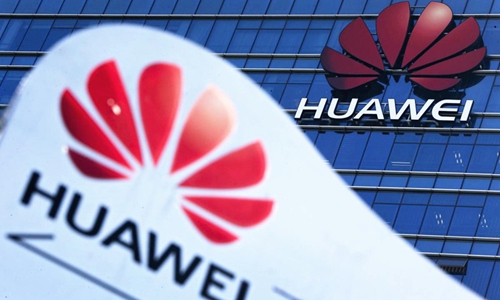HOME >> SOURCE
China needs to be prepared for US financial sanctions
Source:Global Times Published: 2019/12/4 22:24:19

The logo of China's tech giant Huawei. Photo: Xinhua
It seems that Huawei faces an endless list of tests, with the latest media report suggesting that the Trump administration may go further to place the Chinese technology giant on its Specially Designated Nationals (SDN) list, restraining its access to the US financial system.If this sanction is really imposed on Huawei, which has a massive trading network, then from the perspective of US-China relations and the global financial chain, it would mean a substantial decoupling between the world's two largest economies.
The global industrial chain would be restructured as a result, with both Chinese and American companies suffering.
Financial sanctions on Huawei may only be a possibility at present, but the mere existence of such possibility is already bound to trigger more difficulties and challenges for the Chinese company, because other institutions may reduce or end doing business with it due to fear of being implicated.
Though Huawei may have foreseen the most serious sanctions coming its way and made relevant preparations, the impact will still inevitably be huge. Unlike general economic sanctions that have a certain impact on trade, financial sanctions target the foundation of global trade - payments and settlements, which usually inflict devastating damage on a company or a country.
The deterrent power of American financial sanctions comes from US financial hegemony, which is hard to shake in the short term. Financial hegemony is such a powerful weapon that the US will unlikely keep it only for Huawei, so there's a high possibility that other Chinese companies or banks could become future targets.
It is essential for China to be prepared to guard against different levels of financial sanctions from the US. First, Chinese authorities need to protect relevant institutions and companies from being involved in any incidents or trouble that may escalate and lead to financial sanctions.
Second, China needs to speed up the establishment of a new settlement system for global trade or join forces with some European countries on this issue. For instance, after six EU countries declared that they would join the INSTEX mechanism for trade with Iran, China's Foreign Ministry spokesperson Hua Chunying said on Tuesday that China hopes the mechanism could soon cover more areas and open up to non-EU countries as third parties.
Third, the abuse of dollar-based financial hegemony has actually accelerated the de-dollarization process. During this process, China should continue its push for the yuan's internationalization. When it comes to trade and investment where China has bargaining power, it should encourage more use of yuan-denominated pricing and settlement.
Fourth, the technological revolution may help expand China's influence on global payment and monetary systems. This is why the Chinese central bank is making all-out efforts to roll out its own digital currency electronic payment system, with the aim of becoming a bellwether in cryptocurrencies.
Posted in: GT VOICE